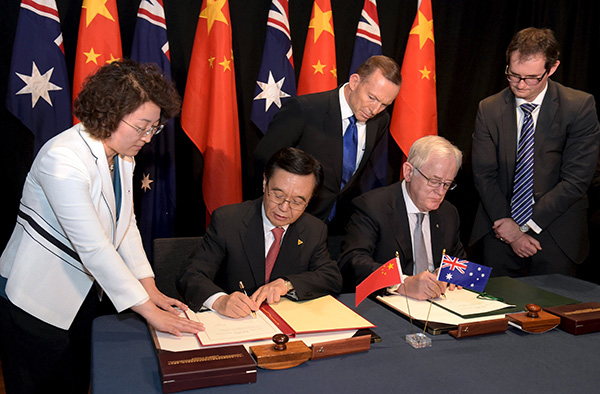China, Australia sign free trade agreement
Updated: 2015-06-17 10:22
By Zhong Nan(chinadaily.com.cn)
|
|||||||||||
 |
|
Australian Prime Minister Tony Abbott (C) watches as China's Minister of Commerce Gao Hucheng (2nd L) and Australian Minister for Trade Andrew Robb (2nd R) sign a trade agreement during an official signing ceremony in Canberra June 17, 2015. [Photo / Agencies] |
China and Australia signed a free trade agreement on Wednesday after a decade of negotiations, covering areas including a simplified review procedure for investments, most-favored-nation status and easier market access to service sector.
Under the agreement, 85.4 percent of goods traded between both sides will cut tariffs to zero immediately. About 97 percent of Australian exports to China will be tariff free following the designed timeline step by step. There will include many agricultural products such as beef, dairy and wine. Australia will eventually reduce tariffs to zero on all goods imported from China.
China's major exports to Australia are machinery, telecommunication equipment, computer, furniture and garment product, and its main import from Australia are iron ore, coal, gold, copper, education-related travel services and agricultural products, according to the Customs data.
Official figures show trade volumes between China and Australia jumped from $88.1 billion in 2010 to $136.9 billion in 2014. Australia had $9.4 billion trade surplus with China last year.
Australia's service businesses, such as education, tourism, telecommunications, healthcare and financial services, will gain more market access into China, either by partnering up with Chinese companies, or in certain situations being able to access those markets directly.
Private Chinese investment under $830,000 will not be subject to the approval of Australia's Foreign Investment Review Board. There also will be an Investor State Dispute Settlement mechanism under the agreement.
China was Australia's largest export market for both goods and services in 2014, accounting for nearly a third of total exports, and a growing source of foreign investment.
Eager to seek more new market growth points with close trade partners together, China also signed its largest bilateral free trade agreement in terms of volume with South Korea earlier this month.
Under the deal, China will remove tariffs on 91 percent of all products from South Korea within the next 20 years, while Seoul will eliminate tariffs on 92 percent of all goods in the other direction.
FTA signals new era in trade ties
The China-Australia Free Trade Agreement (FTA), agreed upon by President Xi Jinping and Australian Prime Minister Tony Abbott last November, is set to start a new era in trade ties between the two countries.
Under the FTA, Australia will eventually reduce tariffs to zero on all goods imported from China, and China will remove tariffs on the vast majority of Australian goods. It will also include opening-up of numerous service sectors, a simplified review procedure for investments, most-favored-nation treatment, favorable market access rules and market transparency.
Related Stories
Australia should stay away from South China Sea 2015-06-10 07:47
Australia ready to host should 2022 World Cup be stripped from Qatar 2015-06-04 13:49
Californians turn to Australia to learn how to fight drought 2015-06-01 11:15
Trade ties with South Australia to increase 2015-05-30 10:05
Wuxi seeks business opportunities in Australia 2015-05-27 15:53
Today's Top News
Why thousands of Chinese are migrating to Europe every year
European bank seeks to combine strength with AIIB
Alibaba sees business potential in Russia
Visa process for Chinese traveling through Europe streamlined
Grexit risk hikes
The most costly cities for expats
China, Russia sign railway deal
No mistreatment of GSK sleuth: Govt
Hot Topics
Lunar probe , China growth forecasts, Emission rules get tougher, China seen through 'colored lens', International board,
Editor's Picks

|

|

|

|

|

|






